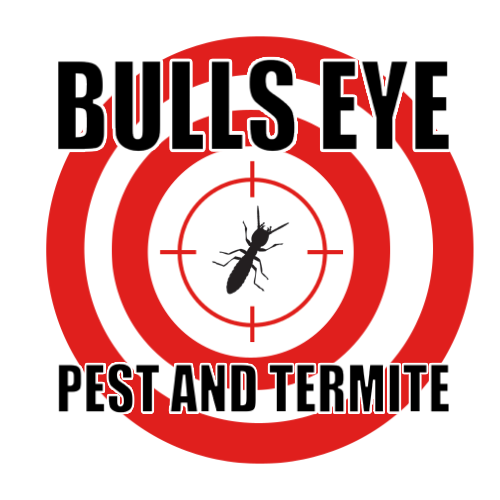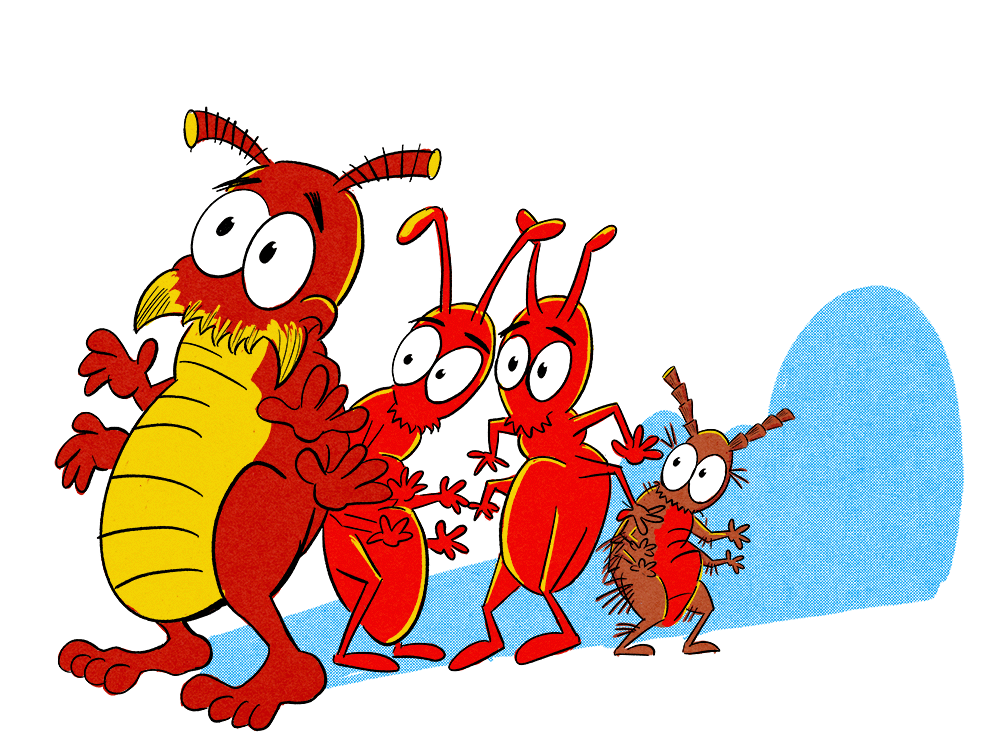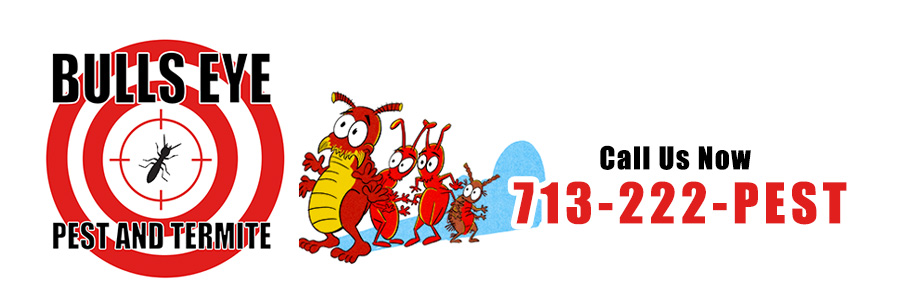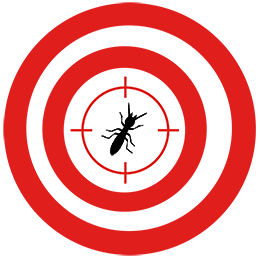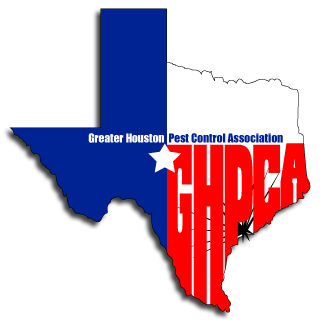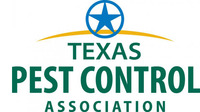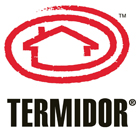Our Guide to Houston Pests
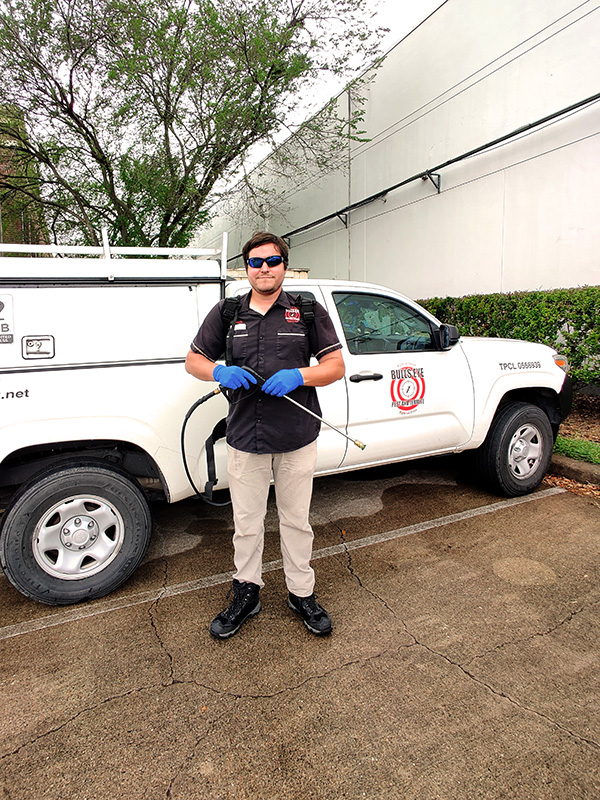
Pest control is never a one size fits all solution. Not all pests are alike. Different pests respond to different treatments. Pests that look similar to one another can require completely different solutions. To treat for pests properly, you have to know what you're dealing with.
Houston's hot, humid climate, large amounts of green space, and swampy ground make it an ideal breeding ground for pests. We're sitting on a major port so we're also continually seeing new, invasive species show up in the city.
At Bulls Eye Pest and Termite, we have over twenty years of experience dealing with Houston and Houston pests. We've put together this guide to Houston pests to share some of that knowledge with you. Our guide to Houston Pests offers information about some of the many varieties of pests in Houston, how to identify them, and tips on extermination and prevention.
Termites
Termites are one of the most damaging insects found in Houston. Termites eat wood, including the wood in houses. A large termite infestation can do significant structural damage to a building. Having your home regularly inspected for termites and applying preventative termite treatments can be essential to protecting your investment in your property.
Learn more about termites in HoustonCockroaches
East Texas has one of the highest concentrations of roaches anywhere in America. Houston's multiple climate zones, overall warmth, and mix of urban and natural environments together create an ideal breeding ground for multiple species of roaches. There are eight separate species of cockroaches in Houston that may be considered pests.
Learn more about cockroaches in HoustonRodents
Rodents are a significant pest problem in Houston. Rats and mice can find abundant sources of food and shelter in the city. Sometimes they can find that food and shelter in your home. Beyond just being a nuisance pest, rats and mice can also carry dangerous diseases. Finding evidence of rats and mice in your home should be taken seriously, and knowing what kind of rodent you’re dealing with can be helpful in knowing how to get rid of them.
Learn more about rodents in HoustonMosquitoes
Houston is a nearly perfect breeding ground for Mosquitoes. Mosquitoes prefer a humid climate, which Houston definitely has. Mosquitoes lay their eggs in standing or stagnant water, which can also be found in great abundance in the Houston area.
Learn more about mosquitoes in HoustonWasps
Wasps are a group of hard-shelled flying insects. There are multiple species of wasps, which typically have a yellow or brownish body with darker stripes or markings. Wasps are also known for their sting. Some wasp species are solitary, others will live in large colonies. While some wasps will avoid human contact, others will build nests near or even inside human homes and can be aggressive when disturbed.
Learn more about wasps in HoustonSugar Ants
Sugar ants aren’t a single species of ants. There are number of different types of small ant that are called sugar ants, because they all have one thing in common - the habit of entering people’s homes looking for sweet foods. When people encounter sugar ants, it’s usually in the form of a line of these ants marching across their kitchen counter, carrying food back to the colony.
Learn more about sugar ants in HoustonFire ants and Stinging Ants
There are two species of stinging and biting ants in Houston, fire ants and red harvester ants. These two species are similar in appearance and both will swarm when attacked, are are often mistaken for each other. Both species of stinging and biting ant in Houston should be taken very seriously. Their bites can be very painful and both fire ants and red harvester ants ants will swarm when they feel their nest is under threat.
Learn more about fire ants and stinging ants in HoustonCrazy Ants
Crazy ants, also known as Tawny Crazy Ants or Raspberry Crazy Ants, are a newly arrived species in the United States, first being identified in Texas in the early 2000s. These ants are usually about 1/8th of an inch in length, with a reddish-brown color and noticeably darker head. They are most easily identifiable by their movements. As opposed to ants that move in straight lines, crazy ants move in large swarms, with individual ants moving within the swarm in erratic, even seemingly chaotic, motions. This irregular movement is what gives the name crazy.
Learn more about crazy ants in HoustonScorpions
There are over 1,500 known species of scorpion across the world, of which about 20 live in Texas. Only one of these species is commonly found in East Texas, the striped bark scorpion, and it does live in Houston. The striped bark scorpion is a medium-sized scorpion, usually around 2 1/2 inches in length. These scorpions are pale yellow color with two broad, darker-colored bands crossing the back and a dark triangular patch near the head.
Learn more about scorpions in HoustonFleas
Fleas are a significant pest problem in Houston. Fleas are small, biting, parasitic insects that feed on the blood of other animals. The presence of fleas is often detected from their bites before the fleas themselves are seen. Flea saliva contains allergens and their bites leave small, red, extremely itchy welts. A flea infestation is incredibly unpleasant and can be dangerous.
Learn more about fleas in HoustonWood Destroying Pests
Termites are not the only pests in Houston that destroy wood. There are several other species of wood-eating and wood-burrowing insects that live in the city and that can do damage to your property. If you see what looks like insect-related damage to the wood in or around your house, the nature of the holes and marks they leave in the wood can be the key to identifying and eliminating them.
Learn more about wood destroying pests in HoustonMoths
Moths are mostly nocturnal flying insects, many species of which are known for their habit of flying towards light. While most moths are harmless, there are some kinds of moths that can can be a nuisance pest and cause property damage. Pantry moths and clothes-eating moths are both common pests in Houston
Learn more about moths in HoustonBoxelder Bugs
Boxelder bugs are dark brown to black in color, with distinctive reddish-orange markings on their thorax and wings. These bugs can grow up to 1/2 an inch in length. They primarily feed on the buds of boxelder trees, hence their name, but will also feed on maple and ash trees. Boxelder bugs do not cary disease and are not a threat to human health, but they can become a pest because of the damage they do to plants and their tendency to swarm inside homes.
Learn more about boxelder bugs in HoustonSpiders
In Houston, most of the spiders you find in your home won't do you any harm. But there are two species of venomous spiders in the city, black widow spiders and brown recluse spiders, and you should treat them with extreme caution if you find these spiders in your home.
Learn more about spiders in HoustonSilverfish
Silverfish are smallish, blue-gray insects with a carrot-shaped body and long, protruding antennae and legs. Silverfish thrive in areas of high humidity, so Houston is an ideal habitat for them. They are found in damp, dark environments and are almost exclusively active at night. They're not dangerous insects, they don't carry diseases, but they can be a considerable nuisance because of their property-destroying diet.
Learn more about silverfish in HoustonFlies
The are over one million species of flies around the world. Most of these are harmless and rarely interact with humans, and only a few of these species are considered pests. When it comes to Houston, the only species we usually have to worry about are house flies and fruit flies.
Learn more about flies in HoustonRequest a Quote
713-222-PEST (7378)
By submitting, you agree to receive occasional text messages or emails for appointment reminders and promotions from Bulls Eye Pest and Termite. To opt-out reply STOP at any time. Msg & Data rates may apply.
What Our Customers Are Saying
Excellent service! Very professional and made sure we didn’t have any questions thanks Ruben!!
Maria
Rueben was very polite, informative and professional. Great service from Ruben.
Cheryl
The Tech was on time and very helpful when I had questions.
Daniel
Prompt. Thorough. Personable. Professional.
Dane
